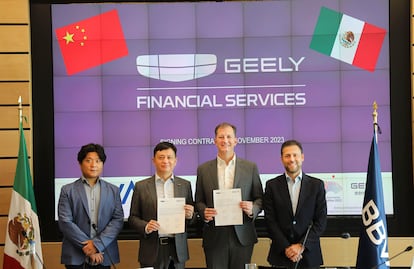Growth of China’s automotive sector in Mexico worries the US
Mexico is the second-biggest market for Chinese-made cars after Russia. The intention of Beijing-based companies to open assembly plants in the Latin American country has alarmed legislators in the United States

They are everywhere. You can see them on the streets of Mexico City, in sponsored videos by influencers on social media… and even on the shirts worn by members of local soccer teams.
Chinese-made cars are increasingly popular in Mexico, a country that manufactures vehicles for export to the United States. And they’re gradually becoming a new point of tension between the two North American countries.
Mexico is the second-largest importer of Chinese cars after Russia, according to data from the supply company LGS, which specializes in examining logistics between China and countries in Latin America. According to the firm, over the past year, Mexico has purchased 260,000 Chinese vehicles.
The Mexican Association of Automotive Distributors (AMDA) reveals that the share of the car market that belongs to Chinese brands rose by almost 6% this past September, to reach 19.4% of overall sales in the first nine months of 2023. Most of these vehicles are imported. Demand is increasing so rapidly that, in October, the port authorities in Michoacán announced that there weren’t enough trailers to remove the Chinese cars from their ships. This resulted in significant traffic congestion.
While the Mexican market could be attractive for China, this isn’t the final objective.
“We are concerned by how the People’s Republic of China (PRC) is preparing to flood the United States and global markets with automobiles, particularly electric vehicles (EV), propped up by massive subsidies and long-standing localization and other discriminatory policies,” read the text of a letter by five members of Congress, who wrote to U.S. Trade Representative Katherine Tai on Tuesday, November 7.
Both the United States and the European Union have intensified a trade war against Chinese cars and semiconductor chips, two sectors that have been at the center of investigations over predatory practices, tariffs and restrictions. This relatively recent geopolitical shift has meant that Western companies have been looking for alternatives to China when it comes to outsourcing their production lines.
The legislators go on to advocate that the American government must “also be prepared to address the coming wave of PRC vehicles that will be exported from our other trading partners, such as Mexico, as PRC automakers look to strategically establish operations outside of the PRC to take advantage of preferential access to the U.S. market through our free trade agreements and circumvent any PRC-specific tariffs.” They mention three major Chinese-headquartered automobile manufacturers that have already established themselves in Mexico: BYD, Chery and SAIC Motor. To nip the problem in the bud, lawmakers are asking Tai to open an investigation into the practices of firms like these.
While various Chinese sectors are making headway in China, the automobile sector is particularly important. This is because, for Mexico, cars are replacing the role that oil previously had in the domestic economy. The contribution of the automotive industry to GDP is 4.8%, while vehicle exports are the main source of foreign currency. This sector generates one million direct jobs and 3.5 million indirect jobs. In fact, 22% of foreign direct investment (FDI) that entered the country in the third-quarter of 2023 went towards this industry.
It’s difficult to know exactly how much of this investment comes from the Chinese government, since the role of China’s public sector in foreign investment — as well as its particular way of doing business — isn’t transparent. If legislators in the United States are aware of three companies that have arrived in Mexico, the Mexican Association of the Automotive Industry (AMIA) only recognizes two.
“There are two Chinese brands that are part of AMIA (SAIC Motor and Chirey Motor). There are two more that are under review,” explains José Zozaya, president of the AMIA, in a phone interview with EL PAÍS. “I cannot mention the two that are under review,” he adds. Not all brands maintain assembly lines in Mexico, while it’s also difficult to track the presence of Chinese-owned factories. The AMIA has a list of 21 car manufacturers in the country, none of which are Chinese. This is despite the fact that JAC Motors — a Chinese firm — has been assembling vehicles in the state of Hidalgo for the past 16 years.
Zozaya says that, behind the rapid growth in the country, there’s an “aggressive” Chinese strategy at play, one that involves low prices and flexible financing options. Mexico — a country that assembles cars sold to the United States — is choosing to import Chinese cars. Of the cars produced in Mexico, 90% are exported and the remaining 10% are sold domestically. But as this isn’t enough to supply the market, 60% of the total number of cars purchased in the country are imported.
This past week, the Spanish bank BBVA announced that it will be the official financier for Geely, one of the best-known Chinese brands (which has been sold in Cuba for almost 20 years). For its part, this past summer, the Mexican subsidiary of the Chinese manufacturer Chery Automobile — known as “Chirey” in Spanish — became a sponsor of the Tigres Football Club of the Autonomous University of Nuevo León, the reigning champion in the national league. In this same state, the company plans to open an assembly plant, according to what the general director told the newspaper El Economista.

China’s big bet – as American lawmakers have pointed out — is on electric and hybrid cars. The PRC is already producing these vehicles at a higher rate than any other country. However, Mexico — given the lack of infrastructure that these cars require, such as charging stations — doesn’t have as much interest in this market. Only 5% of cars in Mexico are electric or hybrid, according to the AMIA. And, of those, only 5% are Chinese.
Electric vehicles are imported into Mexico tariff-free, thanks to a decree that expires in September of next year. What Mexico decides to do with this decree will be key to its relationship with the United States. This is according to Juan Carlos Baker, one of the people who negotiated the USMCA, the trade agreement that substituted NAFTA (1994-2020). The trade agreement requires that 75% of auto content that is exported by Mexico to the U.S. and Canada must be made in North America.
“If these [Chinese] companies arrive, they’ll have to spend a number of years [in operation] before they develop all their supplies in the automotive industry, especially if they’re [focusing on] high-end electric cars, since it will take years before they can certify their suppliers. Right now, it’s difficult to imagine that they’re going to be exporting to the United States,” Baker notes. “But, if [their presence] grows and strengthens, and the U.S. government wants to pressure Mexico to close that door [on China], the United States would have many possibilities to do so,” he affirms.
Diego Ocampo— general director of the supply company LGS — specializes in business between the Asian giant and Latin American companies. Within his firm’s portfolio, there are 300 Chinese suppliers. “During the pandemic, we began to hear from suppliers, who had a desire to come to Mexico to set up their factories. They told us [that they wanted access] to Mexico’s free trade agreements,” he recalls.
The current traffic jam around the Lázaro Cárdenas port in the state of Michoacán has been a wake-up call, Ocampo warns. “They tell me ‘we have thousands of cars held up, we’re [losing hundreds of thousands of dollars] because of the delays.’ So, I believe that the future of Chinese automotive companies in Mexico is to assemble here [to avoid shipping issues]. This won’t only attract [more jobs] — it’ll bolster national competitiveness.”
To comply with the USMCA, Ocampo explains, foreign companies could carry out processes — such as automotive injection molding — in Mexico, without having to relocate the most valuable and sophisticated elements of electrical technologies (such as the production of semiconductor chips). This possibility has raised some alarms in the United States.
“There is certainly a political dimension here,” says Eric Farnsworth, vice president of the Americas Society/Council of the Americas. “[Chinese automotive firms will] be able to sell into the Mexican market, but primarily to export into the rest of North America, which is a much larger market. And that is very much a reality that is beginning to capture people’s attention in Washington.”
Both countries will hold general elections in 2024. Farnsworth hopes that the next administrations — both in the United States and Mexico — will end up addressing the issue. “The bilateral relationship between the U.S. and Mexico is already under strain and it will be strained further if people perceive that China is entering the United States through the soft underbelly of Mexico,” the specialist predicts.
“The relationship between Mexico and the U.S. is so profound that we want it built on opportunity and growing relationships as opposed to enforcement and mutual recriminations,” Farnsworth continues. “There’s a role here for both countries, not just the U.S., in terms of enforcing USMCA, but frankly, also Mexico in terms of determining who can invest in Mexico and under what conditions.”
Sign up for our weekly newsletter to get more English-language news coverage from EL PAÍS U.S.A Edition
Tu suscripción se está usando en otro dispositivo
¿Quieres añadir otro usuario a tu suscripción?
Si continúas leyendo en este dispositivo, no se podrá leer en el otro.
FlechaTu suscripción se está usando en otro dispositivo y solo puedes acceder a EL PAÍS desde un dispositivo a la vez.
Si quieres compartir tu cuenta, cambia tu suscripción a la modalidad Premium, así podrás añadir otro usuario. Cada uno accederá con su propia cuenta de email, lo que os permitirá personalizar vuestra experiencia en EL PAÍS.
¿Tienes una suscripción de empresa? Accede aquí para contratar más cuentas.
En el caso de no saber quién está usando tu cuenta, te recomendamos cambiar tu contraseña aquí.
Si decides continuar compartiendo tu cuenta, este mensaje se mostrará en tu dispositivo y en el de la otra persona que está usando tu cuenta de forma indefinida, afectando a tu experiencia de lectura. Puedes consultar aquí los términos y condiciones de la suscripción digital.









































